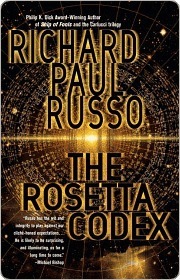‘Cale Alexandros was five years old when his family’s starship was attacked en route to Morningstar, the lone outpost of civilization on a savage planet. Cale crash-landed in the wilds, and was picked from the wreckage by brutish nomads.
For years, he was forced to endure life as a slave, until a kind trader finally freed him. But Cale never forgot what he had seen in the desert wastes... or the temple that held a book with pages made of a strange metal, and the writings he could not identify.
When he finally reaches Morningstar, Cale realises the importance of his discovery. For the book is a key to understanding an alien language. But it also holds a secret that some people want to learn – and a revelation that some will do anything to control...’
Blurb from the 2007 Ace paperback edition
A freighter making a clandestine trip to the planet Conrad’s World is attacked. The Captain asks a young woman, Sidonie, to take his five year old son, Cale Alexandros, to safety in the city of Morningstar. She and the boy escape the ship but crashland well before the city in the badlands before the Divide, a vast chasm which separates the apparently civilised city Morningstar from this area, populated by exiles, criminals and political dissidents.
Cale is dragged from the wreckage by a nomadic and savage community who treat him as a slave.
A mysterious and seemingly amoral traveller, Blackburn, offers to take Cale away with him to Morningstar, but Cale, perhaps sensing Blackburn’s nature, refuses.
Cale later escapes to another community but is beaten up after being discovered in a compromising position with a young girl and is forced to move on, during which journey he discovers a ruined temple filled with alien hieroglyphs, and a book which contains text not only in the alien characters, but translated into a number of human languages – The Rosetta Codex.
He buries the book with the body of a fellow-traveller and eventually crosses the Divide and reaches Morningstar.
Cale bumps into Blackburn with unlikely regularity, although their meetings don’t come to much. He then takes up with a xenoarchaeological cult called The Resurrectionists, and is then tracked down by his old guardian, Sidonie, whom he thought dead.
Sidonie tells him he is heir to an interplanetary corporation. After recovering The Rosetta Codex, he returns to his home world where he plans to follow the instructions in the Codex; to travel to a designated star and awaken the Emissary so that the Jaaprana may live again. He is, however, dogged by Blackburn and the cyborg Sarakheen, Justinian, who need the Codex to translate the alien technology manuals they have amassed.
It would be unfair to call Russo merely a pessimist, although on first reading his work he gives a very bleak, if realistic, assessment of the human condition. Here, we are in a human civilisation in decline. At one point, when trying to persuade Cale of the Sarakheen’s need for the Codex(their goal is to create true cyborgs, devoid of human weaknesses) they take him to a remote warehouse where the elite of this new world are watching gladiator-style fight-to-the-death combats. Blackburn’s point is that Man, though technologically blessed and having spread to the stars, cannot throw off the dark and savage animal needs that dwell within him, something that the Sarakheen would be able to do with the Codex.
There is, however, goodness in Humanity, which is evinced by Cale himself and the friends he makes. Several people help Cale and ask for little or nothing in return.
Russo’s style generally evokes a curiosity within the reader since although we move through a variety of locations and social settings we do not get a real view of the wider galactic society although it is clear from the text that interstellar human civilisation is in decline. Manufacture of interstellar ships has virtually ceased and although many colonial cities are built on the ruins of the Jaaprana cities there is very little interest in archaeological research.
Cale is given a choice at the climax of the novel and, although the choice is taken out of his hands it is no doubt a question that every reader would ask themselves. What would I have done?
The concept of Fate and Destiny is also a strong theme in this book. Cale meets Alazar on the bad side of the Divide, and is witness to one of his brother’s Harlock’s visions which appears to relate to the destiny of all three of them in retrospect.
Back on his home world, Cale, apparently coincidentally, meets the brothers again, as well as Blackburn, whose true calling and origins are never determined.
Also, Cale meets with his father’s horoscoper, who appears to have set or predicted Cale’s destiny from the time before he was stranded on Conrad’s world.
This the very concept of free will is brought into question, and is possibly the reason that the decision was taken out of Cale’s hands at the denouement.

